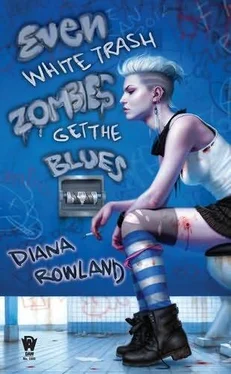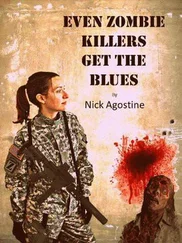She chuckled. “Actually probably not anymore, now that you’re a zombie. But I’ll explain why that is in a second.”
“Don’t feel bad, Angel,” Marcus said. “I’ve been through the same Zombie 101 class. Luckily, Sofia does a great job of making it understandable.”
“If you say so,” I said, trying not to sound too doubtful.
Sofia didn’t seem to notice. “First let me explain viruses,” she continued. “Success, to a virus, is making a gazillion infectious copies of itself and making its host as infectious as possible, whatever the cost. Absolutely nowhere in this business model is there any accountability or design to save the host resource. It banks on having an inexhaustible supply of hosts available to infect. Keeping the host alive and happy just isn’t in the sales pitch.” She paused. “I like to compare a virus to a bad company that sets up shop in a third world country to make, say, shoes. After the third world country is raped of every resource the company can get its grubby hands on to build the factories and shoes, the people are starving, and the land has been strip-mined, the company at no point goes, ‘Hmmm, maybe we should fix this.’ Instead it pats itself on the back for selling lots and lots of shoes, packs up, and sets up shop all over again in a brand new third world country. This exploitive business assumes there will always be an inexhaustible supply of new countries to inhabit and strip-mine.”
I mulled that for a few seconds, shocked to find that I actually understood what she was saying. “Right. And we’re not like that. We don’t try and infect everyone we come in contact with.”
“Exactly!” she said, bringing her hands together. “But there’s even more to it than that. Your form of zombieism actually benefits you in many ways.”
“Like the healing up and super-strength and stuff?” I asked.
She gave a nod. “It would be a lot of evolutionary leg work and a lot of extra genetic programming to turn a virus into something that would consistently benefit its host. Each change in behavior would mean a genetic change…but here’s the thing: Because viruses use the host’s resources—machinery and energy, they don’t actively select against mutation. This is because there is no loss to the virus in letting itself just mutate; it’s only wasting its hosts’ resources, not its own. So, although useful mutations are selected for, the bad mutations aren’t necessarily selected against.”
I could feel my eyes beginning to glaze over. “And this means…?”
Sofia smiled. “It means that there’s pretty much no way a virus could do what your zombieism does.”
“And a parasite could?”
“Right!” She gave me a probing look. “Are you ready for phase two of my lecture?”
“Sure, why not,” I said, settling into a more comfortable position on the couch. “Maybe some of this shit will be on the GED.”
“Somehow I doubt that!” she said with a wry grin. “All right then: a parasite needs the host to live long enough for it to successfully complete its life cycle; grow, reproduce, et cetera. Parasites use the host more like an environment, rather than a stopover factory. A parasite needs to inhabit and use its hosts’ resources, but,” she paused, “and here is the big ‘but’: It needs the host to survive. If the parasite manages to kill the host before it—the parasite—completes its life cycle, it fails. After its life cycle is over, it can kill the host all it wants, but not before.”
“Like…tapeworms?” I asked again.
“Better. See, it’s pretty clear to me that this parasite has a long life cycle. Longer than a human’s, which is why it’s in its best interest to regenerate the host.” She held up a hand. “But, of course, not at the risk of its own well being. We’re talking about a parasite here, after all, not a charity.”
I sat up straight. “Oh! I get it! It heals us up when it has the brains, and it lets us rot when it doesn’t.”
She clapped her hands. “Yes! Regeneration when there is food available, and sacrificing the host—the rotting—when it’s hungry.”
“That’s so cool,” I breathed. “And disgusting.”
Marcus laughed. “All right, Sofia. Now tell her about the mold.”
I shot him a frown. “Mold?”
Sofia let out an exasperated sigh. “Not mold—fungus.” She looked back at me. “And here is where I will explain how it’s not like tapeworms, where a dose of the right kind of meds would clear it right up.”
“Go for it,” I said lacing my fingers behind my head.
She launched herself to her feet and began an excited pacing. “Well, the first thing I looked at was how a new zombie is made.” She glanced up at Marcus. “Marcus and Pietro were able to give me a fair amount of information about the process, and it’s clearly not spreadable through a casual bite.”
“It, um, takes a bit of mauling,” Marcus said. He didn’t look at me, which was a relief for me. I didn’t want to think about the fact that he’d obviously had to do that to me to make me a zombie.
“Right,” Sofia said. “It takes a bit of doing to get the parasite to spin off an infecting spore and get it into the bloodstream of the new host, which is why it can’t be transferred via a simple blood transfusion or organ donation.” She looked at me with a slight frown. “Are you sure you want to hear the rest? It might be a bit unsettling to hear what happens when the parasite sets up shop.”
At this point I wasn’t at all sure I wanted to hear the rest, but I sure as hell didn’t want to look weak in front of this woman. I felt inadequate enough, thank you very much. “I’m cool,” I said with a smile I didn’t feel. “Lay it on me.”
She took a deep breath. “Here goes. Once the victim has been bit, the infecting spore has access to the bloodstream and through the bloodstream the lymphatic system. From there it hits the immune system and pretty much takes over. It can now tell the host what it’s allowed to fight off infection-wise, and programs the immune system to think that the parasite is a friend. So, once the immune system is under the control of the parasite, it’s free to roam without it getting harmed or having the host get sick.
“It next travels through the human body, using the bloodstream and lymph system, to every organ and tissue type. At each new stop, it sets up a satellite colony that adapts and mimics the organ, and it makes sure to take over shop and do any necessary repairs. This is the initial colonization—setting up satellite colonies in every organ and making sure the organ is running smoothly, and also setting up a repair shop, so to speak.” She gave Marcus a meaningful look. “Which is why you didn’t die of rabies.”
He gave a short nod.
Sofia’s attention came back to me. “And is why you most likely don’t still have the chicken pox virus in you, or even if you do, you don’t have to worry about it coming back to haunt you in the form of shingles.”
She was right. I wasn’t ready to hear this. “In other words, this zombie parasite is all through me?” I asked, swallowing hard.
“Yes. Even the brain. I’m still not sure of the exact mechanism by which it crosses the blood-brain barrier—it might simply force its way in, since it has control of everything else. But the good news is that it doesn’t kill anything.” She gave me what was probably meant to be a reassuring look. “What it does is head for the hunger center and gets itself hardwired in.” She shrugged. “And there are probably all sorts of specialized cell-cell junctions, so no way is it getting ripped out of there. Even under the worst circumstances, it’s wedged into the brain tight. And now that the satellite colony in the brain is set up, the infection is complete.”
Читать дальше












